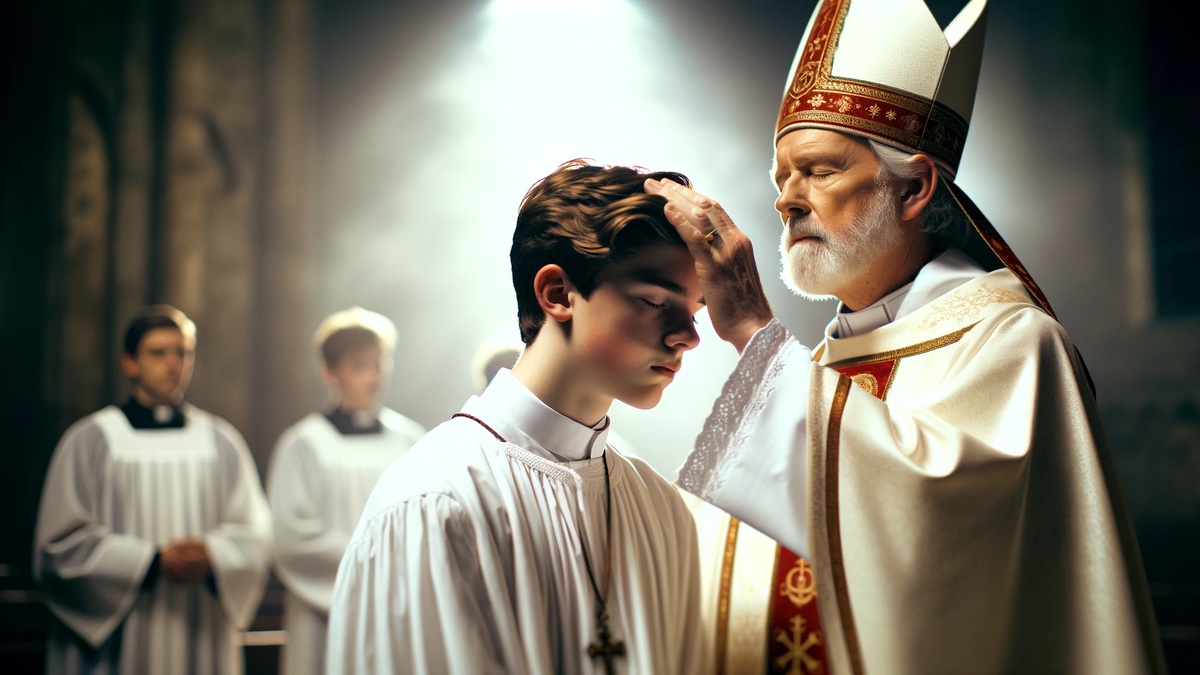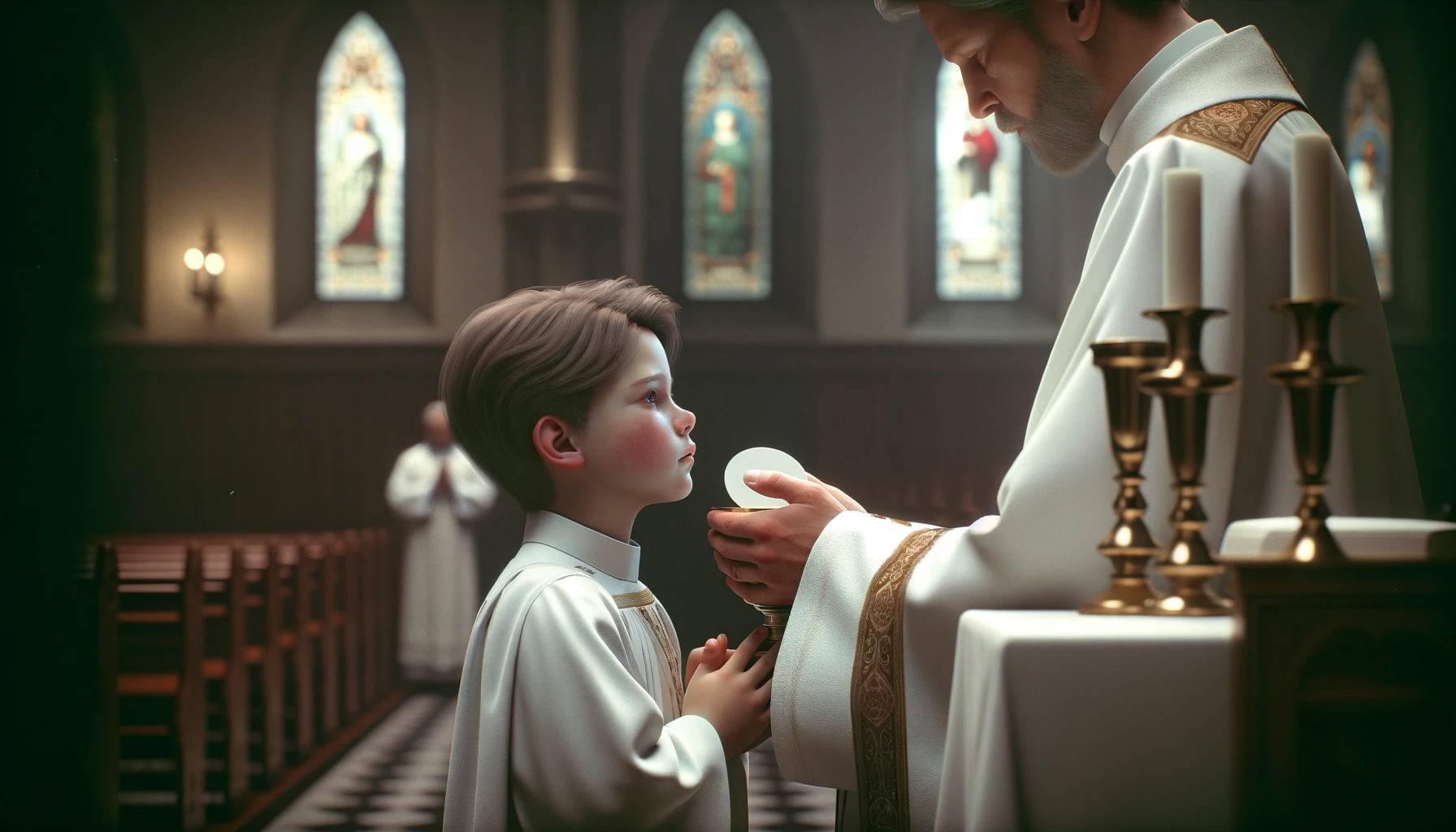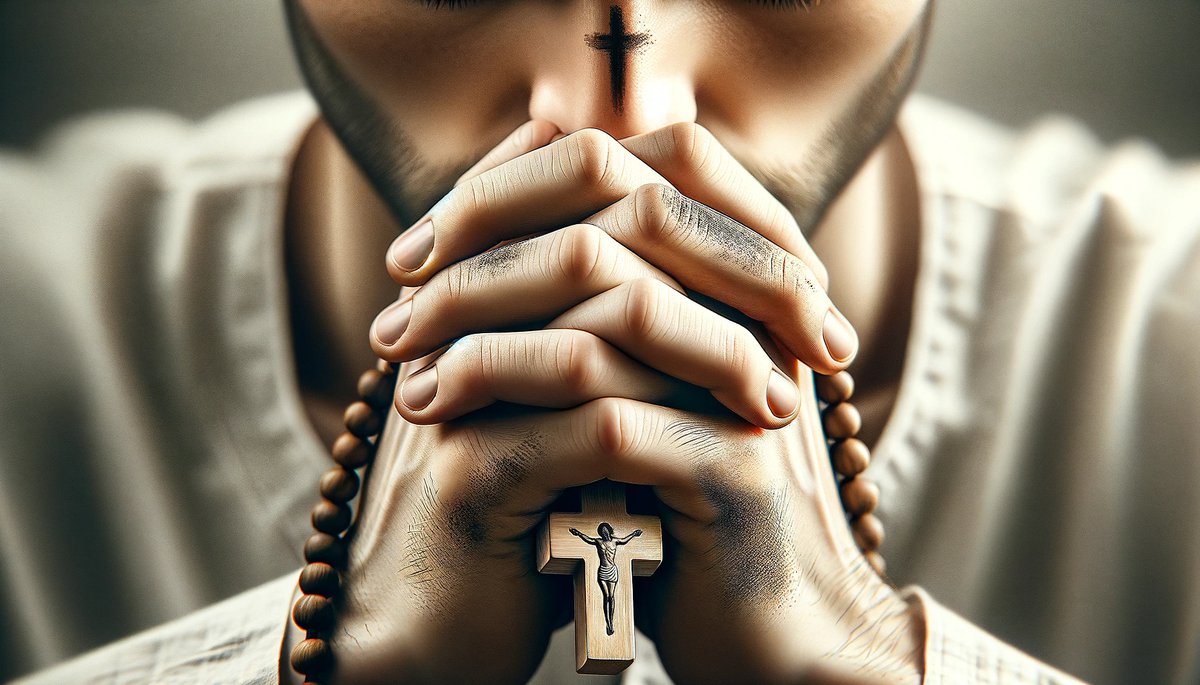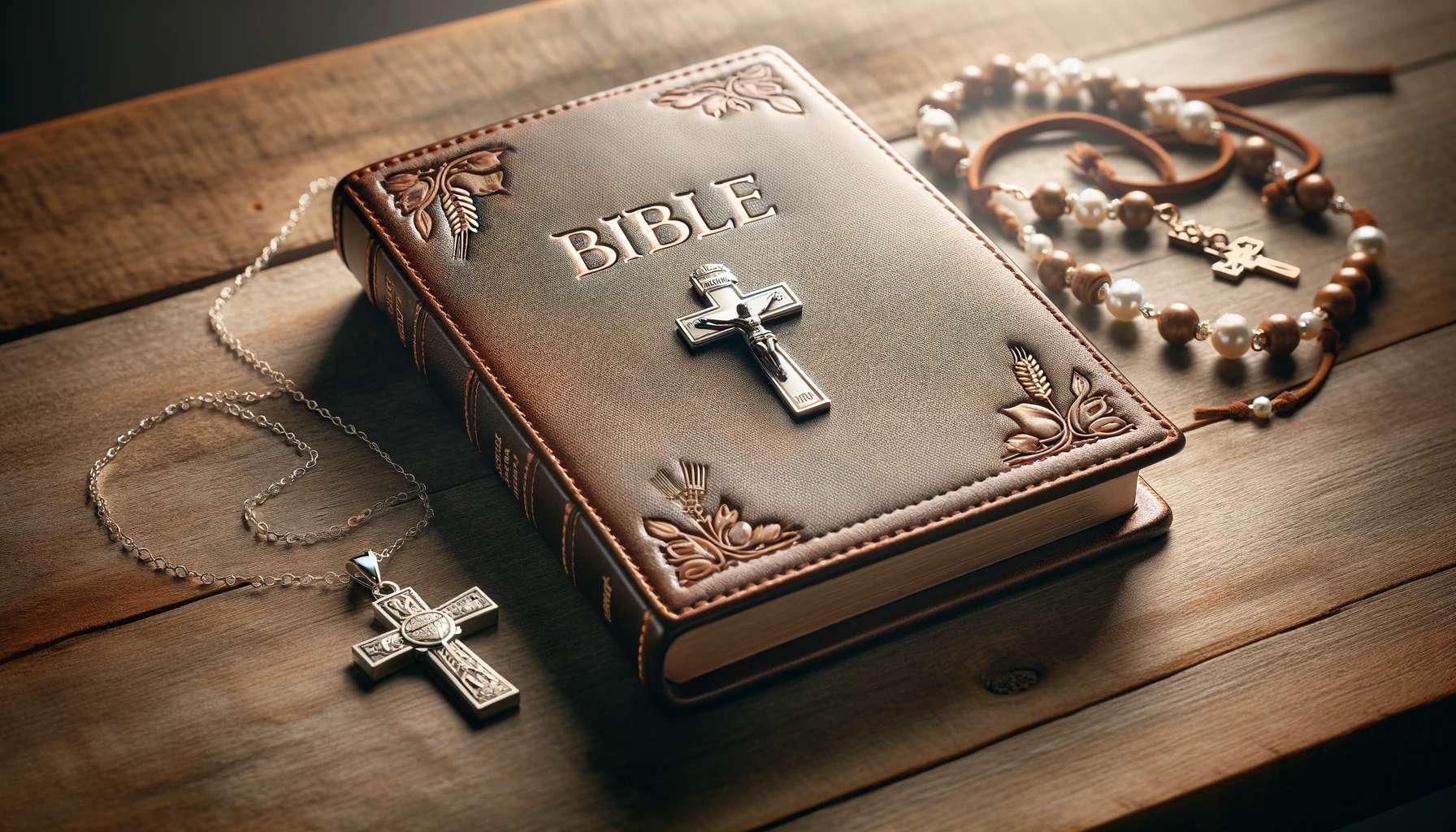Home>Theology and Spirituality>What Does The First Communion Mean


Theology and Spirituality
What Does The First Communion Mean
Published: February 24, 2024
Ericka Andersen, an editor at Christian.net, expertly merges digital strategy with content creation, focusing on faith and societal issues. Her communication skills enhance the platform's engaging narratives, fostering meaningful dialogue on belief's impact on society.
Discover the significance and symbolism of the first communion in theology and spirituality. Explore the spiritual meaning and traditions of this sacred sacrament.
(Many of the links in this article redirect to a specific reviewed product. Your purchase of these products through affiliate links helps to generate commission for Christian.net, at no extra cost. Learn more)
Table of Contents
Introduction
The First Communion is a momentous occasion in the life of a young Catholic, marking an important step in their spiritual journey. It is a sacred rite of passage that holds deep significance within the Catholic Church and is celebrated with great reverence and joy by families and communities. This pivotal event symbolizes the child's initiation into the Eucharist, the central sacrament of the Catholic faith, and represents a profound commitment to their religious upbringing.
The First Communion, also known as First Holy Communion, is typically received around the age of seven or eight, a time when children begin to develop a deeper understanding of their faith and the teachings of the Church. It is a moment of great anticipation and preparation, as families and religious instructors guide the young communicants in comprehending the spiritual and sacramental significance of this milestone.
As the young candidates embark on this sacred journey, they are encouraged to approach the sacrament with a sense of reverence and awe, recognizing the solemnity of partaking in the body and blood of Christ. The First Communion serves as a foundational experience that instills a sense of spiritual belonging and fosters a deeper connection to the Catholic community.
This article delves into the profound significance of the First Communion within the Catholic tradition, exploring the spiritual preparation, the ritual itself, and the enduring impact it has on a child's spiritual growth. By delving into the rich tapestry of traditions and beliefs surrounding this sacrament, we gain a deeper understanding of its importance in the lives of young Catholics and the broader faith community.
Read more: What Does The First In First Baptist Mean
The Significance of First Communion in the Catholic Church
The First Communion holds profound significance within the Catholic Church, serving as a pivotal moment in a child's spiritual journey. This sacramental rite marks the first time a young Catholic receives the Eucharist, the body and blood of Christ, during the Mass. It is a sacred occasion that signifies the child's initiation into the central sacrament of the Catholic faith, symbolizing their growing understanding of the teachings and traditions of the Church.
At the heart of the First Communion is the belief in the real presence of Jesus Christ in the consecrated bread and wine. This transformative act of receiving the Eucharist is a deeply spiritual experience, as Catholics believe that through this sacrament, they are united with Christ and nourished by His divine grace. The First Communion thus represents a profound moment of encounter with the living Christ, fostering a sense of spiritual closeness and communion with the Lord.
Furthermore, the First Communion is a sacrament of initiation, signifying the child's entry into the full participation of the Church community. It is a visible expression of their belonging to the body of Christ, the Church, and a reaffirmation of their baptismal vows. Through this sacrament, children are welcomed into the faith community, where they are embraced and supported in their spiritual growth.
The significance of the First Communion extends beyond the individual experience, as it also reinforces the bond of family and community within the Church. Families and communities come together to celebrate this sacred milestone, offering prayers, guidance, and unwavering support to the young communicants. This collective affirmation underscores the interconnectedness of the faithful and the shared commitment to nurturing the spiritual development of the next generation.
In essence, the First Communion holds deep spiritual, communal, and familial significance within the Catholic Church. It represents a foundational moment of encountering Christ, embracing the faith community, and affirming one's identity as a Catholic. This sacred event resonates with enduring meaning, shaping the spiritual identity of the young communicants and fostering a profound sense of belonging within the rich tapestry of Catholic tradition.
Preparation for First Communion
The preparation for First Communion is a significant and transformative journey that lays the foundation for a child's understanding of the Eucharist and their faith. This period of preparation is a time of spiritual growth, education, and reflection, as young candidates are guided in comprehending the sacred nature of the sacrament and its profound significance within the Catholic tradition.
The process of preparing for First Communion typically begins well in advance of the actual ceremony, allowing ample time for children to absorb the teachings of the Church and develop a deeper connection to their faith. Central to this preparation is the role of religious education programs, often conducted within the parish or through Catholic schools, where children receive instruction on the meaning of the Eucharist, the significance of the Mass, and the importance of prayer and reflection in their spiritual lives.
In addition to formal instruction, families play a crucial role in preparing their children for First Communion. Parents and guardians are encouraged to engage in meaningful conversations with their children about the sacrament, nurturing their understanding and reverence for the Eucharist. This may involve reading scripture together, discussing the life of Jesus, and emphasizing the values of love, compassion, and service that are integral to the Christian faith.
As part of their preparation, young candidates often participate in special religious education classes or retreats designed to deepen their spiritual awareness and foster a sense of reverence for the Eucharist. These experiences provide opportunities for reflection, prayer, and communal bonding with fellow communicants, reinforcing the significance of the sacrament within a supportive and nurturing environment.
Furthermore, the preparation for First Communion extends beyond intellectual understanding to encompass spiritual readiness. Children are encouraged to engage in acts of kindness, charity, and service, reflecting the teachings of Christ and nurturing a sense of empathy and compassion towards others. This emphasis on living out the values of the faith underscores the holistic nature of preparation, instilling in children a profound appreciation for the spiritual and moral dimensions of the Eucharist.
Ultimately, the preparation for First Communion is a multifaceted journey that encompasses education, spiritual formation, and communal engagement. It is a time of profound significance, as children are guided in embracing the sacred mystery of the Eucharist and cultivating a deep and abiding faith in the living presence of Christ. Through this comprehensive preparation, young communicants are equipped to approach the sacrament with reverence, understanding, and a heart open to receiving the grace and blessings of the Eucharist.
The Ritual of First Communion
The ritual of First Communion is a sacred and deeply meaningful ceremony that embodies the spiritual significance of receiving the body and blood of Christ for the first time. This solemn occasion is marked by a series of rituals and traditions that reflect the reverence and joy associated with this pivotal moment in a young Catholic's life.
The day of First Communion typically begins with a sense of anticipation and excitement, as the young communicants, dressed in their finest attire, gather with their families and fellow parishioners at the church. The atmosphere is filled with a palpable sense of reverence and celebration, as the community comes together to witness and support the children as they take this significant step in their faith journey.
Central to the ritual of First Communion is the celebration of the Mass, during which the young candidates partake in the Eucharist for the first time. The Mass is a sacred liturgical event, rich in symbolism and tradition, and serves as the focal point of the First Communion ceremony. As the celebrant consecrates the bread and wine, transforming them into the body and blood of Christ, the communicants approach the altar with a sense of awe and humility, ready to receive the Eucharist.
The act of receiving the Eucharist is a deeply personal and profound moment for each child, representing their union with Christ and the faith community. As they approach the altar, they are often accompanied by their parents or sponsors, who offer guidance and support during this sacred encounter. The communicants reverently receive the consecrated host, partaking in the body of Christ, and may also receive the precious blood from the chalice, symbolizing their participation in the fullness of the Eucharistic feast.
In addition to the reception of the Eucharist, the ritual of First Communion may include other symbolic gestures and rituals. For instance, the communicants may recite prayers, present offerings, or participate in processions that underscore the sacred nature of the occasion. These rituals serve to deepen the children's connection to the sacrament and reinforce the communal aspect of their faith journey.
Following the reception of the Eucharist, the First Communion ceremony often culminates in a special blessing for the young communicants, imparting upon them the grace and guidance of the Holy Spirit as they continue their spiritual growth. The community joins in offering prayers and words of encouragement, affirming the children's commitment to their faith and their place within the Church.
In essence, the ritual of First Communion is a poignant and transformative experience that encapsulates the spiritual depth and communal joy of this sacred sacrament. It is a moment of profound encounter with Christ, a celebration of belonging to the faith community, and a testament to the enduring significance of the Eucharist in the lives of young Catholics. Through this ritual, the children are embraced by the love and grace of Christ, setting the stage for a lifelong journey of faith, love, and spiritual fulfillment.
Understanding the Sacramental Meaning
The sacramental meaning of First Communion encompasses profound spiritual significance rooted in the core beliefs of the Catholic faith. At its essence, the sacrament of the Eucharist, received during First Communion, represents the real presence of Jesus Christ in the consecrated bread and wine. This transformative act of partaking in the body and blood of Christ is central to the sacramental meaning, symbolizing the intimate union between the communicant and the living Christ.
In the Catholic tradition, the Eucharist is regarded as the source and summit of the Christian life, embodying the sacrificial love of Christ and the promise of eternal life. Through the reception of the Eucharist, communicants are nourished and strengthened by the grace of Christ, fostering a deep spiritual communion with the Lord and the faith community. This sacramental meaning underscores the profound encounter with the divine, as the communicants are invited to partake in the sacred banquet of the Eucharist, where they are united with Christ and with one another in a bond of love and fellowship.
Furthermore, the sacramental meaning of First Communion extends beyond the individual experience to encompass the communal dimension of the Eucharist. As young Catholics receive the Eucharist for the first time, they are welcomed into the full participation of the faith community, affirming their place within the body of Christ, the Church. This communal aspect emphasizes the interconnectedness of the faithful and the shared journey of faith, as communicants are united in their devotion to Christ and their commitment to living out the values of the Gospel.
The sacramental meaning of First Communion also serves as a profound expression of faith and devotion, as children are called to approach the Eucharist with reverence, humility, and a heart open to receiving the transformative grace of Christ. This act of receiving the Eucharist signifies a deepening of the child's relationship with God and a reaffirmation of their baptismal vows, marking a significant step in their spiritual growth within the Catholic faith.
In essence, the sacramental meaning of First Communion encapsulates the spiritual depth, communal unity, and personal devotion inherent in the Eucharist. It represents a sacred encounter with the living Christ, a celebration of belonging to the faith community, and a testament to the enduring significance of the Eucharist in the lives of young Catholics. Through this sacramental meaning, the children are invited to partake in the abundant grace and blessings of the Eucharist, nurturing a profound sense of spiritual fulfillment and communion with the divine.
The Role of First Communion in a Child's Spiritual Journey
The First Communion plays a pivotal role in a child's spiritual journey, serving as a transformative and foundational experience that shapes their understanding of the Catholic faith and nurtures their relationship with God. This sacred sacrament holds profound significance in guiding children towards a deeper connection to their spirituality and fostering a sense of belonging within the faith community.
At the heart of the First Communion's role in a child's spiritual journey is the invitation to encounter the living Christ in a tangible and profound manner. Through the reception of the Eucharist, children are initiated into the central sacrament of the Catholic faith, where they partake in the body and blood of Christ, symbolizing a sacred union with the Lord. This transformative encounter serves as a catalyst for spiritual growth, instilling in children a sense of awe, reverence, and wonder at the divine presence in their lives.
Furthermore, the First Communion serves as a formative experience that lays the groundwork for a child's ongoing spiritual development. It marks a significant milestone in their journey of faith, fostering a deepening awareness of the teachings of the Church and the values of love, compassion, and service exemplified by Jesus Christ. This foundational experience shapes the child's moral and ethical compass, guiding them towards a life rooted in faith, empathy, and a commitment to living out the Gospel values.
The role of First Communion in a child's spiritual journey extends beyond the individual experience to encompass the communal dimension of faith. As children are welcomed into the faith community through this sacrament, they are embraced by the love and support of their families, fellow communicants, and the broader Church community. This communal affirmation reinforces their sense of belonging and encourages them to actively participate in the life of the Church, fostering a spirit of unity, fellowship, and shared devotion to Christ.
Moreover, the First Communion serves as a catalyst for ongoing spiritual formation and growth, nurturing a lifelong relationship with God and the Church. The profound impact of this sacrament resonates throughout a child's spiritual journey, guiding them as they navigate the complexities of life, deepen their understanding of the faith, and seek to live out their beliefs with integrity and compassion.
In essence, the role of First Communion in a child's spiritual journey is multifaceted, encompassing a transformative encounter with Christ, the cultivation of moral and ethical values, a sense of communal belonging, and the foundation for ongoing spiritual growth. This sacred sacrament shapes the spiritual identity of children, nurturing a deep and abiding faith that serves as a guiding light throughout their lives.
Celebrating First Communion in the Family and Community
The celebration of First Communion is a joyous and deeply meaningful occasion that resonates not only within the individual families but also within the broader community of faith. It serves as a testament to the unity and shared devotion of the faithful, as families and communities come together to honor and support the young communicants on this significant milestone in their spiritual journey.
Within the family, the celebration of First Communion is a time of profound significance, marked by a sense of pride, love, and spiritual devotion. Parents, siblings, and extended family members play a central role in nurturing the faith of the young communicants, offering unwavering support, guidance, and encouragement as they prepare to receive the Eucharist for the first time. The family's involvement in the preparation process fosters a deep sense of spiritual bonding, as they engage in prayer, reflection, and meaningful conversations about the sacrament, reinforcing the values of faith, love, and compassion within the home.
Moreover, the celebration of First Communion extends beyond the immediate family to encompass the broader community of faith. Parish communities, clergy, and fellow parishioners play an integral role in supporting and celebrating this sacred milestone. The parish community often organizes special Masses, liturgical ceremonies, or communal gatherings to honor the young communicants, providing a collective affirmation of their place within the Church and the shared journey of faith. This communal celebration fosters a sense of unity and fellowship, as the entire faith community rejoices in welcoming the children into a deeper participation in the life of the Church.
The celebration of First Communion also serves as an opportunity for the broader community to come together in solidarity and support for the young communicants. Friends, neighbors, and members of the parish community often extend their well wishes and congratulations, further reinforcing the sense of communal joy and affirmation. This collective celebration underscores the interconnectedness of the faithful and the shared commitment to nurturing the spiritual growth of the next generation, fostering a spirit of unity, love, and support within the broader community of faith.
In essence, the celebration of First Communion in the family and community is a testament to the profound impact of this sacred sacrament on the lives of young communicants. It embodies the values of love, unity, and communal support, fostering a sense of belonging and spiritual affirmation within the family and the broader faith community. This celebration serves as a poignant reminder of the enduring significance of the Eucharist in the lives of young Catholics and the collective commitment to nurturing their spiritual journey within the rich tapestry of Catholic tradition.
Conclusion
The First Communion holds profound significance within the Catholic tradition, serving as a pivotal moment in a child's spiritual journey. This sacred sacrament represents a transformative encounter with the living Christ, a celebration of belonging to the faith community, and a testament to the enduring significance of the Eucharist in the lives of young Catholics. From the spiritual preparation to the communal celebration, the First Communion embodies the values of love, unity, and communal support, fostering a sense of belonging and spiritual affirmation within the family and the broader faith community.
As young communicants embark on this sacred journey, they are guided in comprehending the spiritual and sacramental significance of this milestone. The preparation for First Communion is a multifaceted journey that encompasses education, spiritual formation, and communal engagement. It is a time of profound significance, as children are equipped to approach the sacrament with reverence, understanding, and a heart open to receiving the grace and blessings of the Eucharist.
The ritual of First Communion is a poignant and transformative experience that encapsulates the spiritual depth and communal joy of this sacred sacrament. It is a moment of profound encounter with Christ, a celebration of belonging to the faith community, and a testament to the enduring significance of the Eucharist in the lives of young Catholics. Through this ritual, the children are embraced by the love and grace of Christ, setting the stage for a lifelong journey of faith, love, and spiritual fulfillment.
The sacramental meaning of First Communion encapsulates the spiritual depth, communal unity, and personal devotion inherent in the Eucharist. It represents a sacred encounter with the living Christ, a celebration of belonging to the faith community, and a testament to the enduring significance of the Eucharist in the lives of young Catholics. Through this sacramental meaning, the children are invited to partake in the abundant grace and blessings of the Eucharist, nurturing a profound sense of spiritual fulfillment and communion with the divine.
In essence, the role of First Communion in a child's spiritual journey is multifaceted, encompassing a transformative encounter with Christ, the cultivation of moral and ethical values, a sense of communal belonging, and the foundation for ongoing spiritual growth. This sacred sacrament shapes the spiritual identity of children, nurturing a deep and abiding faith that serves as a guiding light throughout their lives.
The celebration of First Communion in the family and community is a testament to the profound impact of this sacred sacrament on the lives of young communicants. It embodies the values of love, unity, and communal support, fostering a sense of belonging and spiritual affirmation within the family and the broader faith community. This celebration serves as a poignant reminder of the enduring significance of the Eucharist in the lives of young Catholics and the collective commitment to nurturing their spiritual journey within the rich tapestry of Catholic tradition.
In conclusion, the First Communion stands as a sacred bridge between childhood and a deeper spiritual understanding, marking the beginning of a profound and enduring relationship with the Eucharist and the Catholic faith. It is a celebration of faith, love, and unity, weaving together the threads of individual devotion and communal support within the rich tapestry of Catholic tradition.














